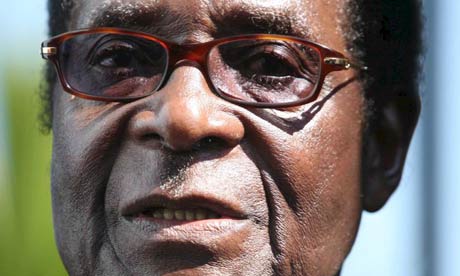British and US efforts to apply punitive pressure on Robert Mugabe were abruptly undermined last night when Russia and China vetoed a UN security council resolution seeking sanctions against Zimbabwe.
The resolution, calling for an arms embargo, and financial and travel restrictions on Mugabe and 13 other regime leaders, was backed by nine nations but foundered on the vetoes of the two permanent members. The arms embargo would have affected Russian and Chinese weapons exporters.
The outcome at UN headquarters in New York will raise questions about the international community's ability to act decisively against Mugabe and his Zanu-PF ringleaders who orchestrated the violence that disfigured Zimbabwe's election run-off last month. Mugabe was declared the victor after his opponent, Morgan Tsvangirai, pulled out citing the absurdity of holding a vote while dozens of opposition members were being beaten, arrested and killed.
Britain's ambassador to the UN, Sir John Sawers, said the security council "failed to shoulder its responsibility to do what it can to prevent a national tragedy deepening and spreading its effects across southern Africa".
He said the Chinese followed the Russian lead and that neither had made any effort to discuss the resolution.
"They simply opposed what was on the table."
David Miliband, the foreign secretary, expressed disappointment at the outcome, and added that the diplomatic stalemate would be "incomprehensible" to the people of Zimbabwe. He added that Russia's veto was particularly hard to understand because Moscow appeared earlier this week to back action against Zimbabwe at the G8 summit in Japan.
"In particular, it will appear incomprehensible to the people of Zimbabwe that Russia, which committed itself at the G8 only a few days ago to take further steps including introducing financial and other sanctions, should today stand in the way of timely and decisive security council action."
Gordon Brown persuaded his G8 counterparts to adopt a tough stance, and thought he had prevailed when the summit issued a statement calling for urgent mediation and the appointment of a UN special envoy, and threatening "financial and other measures against those individuals responsible for violence".
But security council unanimity was a tougher ask. South Africa, Mugabe's leading regional patron, has argued that its neighbour is not a threat to world peace. China has resisted measures it sees as meddling in Zimbabwe's internal affairs.
Russia's UN ambassador, Vitaly Churkin, said there was no mandate to impose sanctions on Zimbabwe because there was no threat to international peace and security.
"The development of the situation in Zimbabwe until now has not exceeded the context of domestic affairs," said China's UN ambassador, Wang Guangya. "It will unavoidably interfere with the negotiation process."
They were joined by Libya and Vietnam in vetoing the resolution. The US, France, Britain, Belgium, Burkino Faso, Costa Rica, Croatia, Italy and Panama voted in favour. Indonesia abstained.
The US insisted that Zimbabwe was a threat to regional security. "There should be no doubt that what is happening in Zimbabwe affects peace and security in the region," said a state department spokesman, Robert McInturff.
Violence in Zimbabwe shows no signs of abating. The opposition Movement for Democratic Change says 113 of its activists have been killed since March.
Many of the wounded have sustained horrific burns and other telltale signs of torture. Yesterday, the MDC said another official, Gift Mutsvungunu, had been murdered. His body was found partly burned and with eyes gouged out in a suburb of Harare, Reuters reported.
Regional powers have tried to encourage Mugabe to meet his opponents halfway in a government of national unity. Low-level contacts have been held in South Africa, under the auspices of South African mediators, but neither side is talking up the process.
Diplomats have in any case become frustrated at the pace and direction of South African intervention. "Mbeki's mediation hasn't made any progress," said Sawers. "We were looking to strengthen those mediation efforts and now will have to look for alternative ways of doing that."
